High blood pressure, diabetes, heart attack, and more — these problems are associated with sleep deprivation. But does lack of sleep cause hair loss, too? Unfortunately, the answer is yes. Sleep deprivation can weaken the hair follicles and lead to hair shedding. In addition, stress and lack of sleep can cause androgenetic alopecia or hair loss (1). This article assesses the relationship between lack of sleep and hair loss. Read on.
In This Article
Science Behind Sleep Deprivation, Stress, And Hair Loss – A Vicious Cycle
Adequate sleep is essential to stay healthy and maintain your well-being. A peaceful sleep for 7-8 hours is needed for the body’s natural repair and regulation process. It also helps your physiological system recover from stress. Insufficient sleep has negative consequences on the health that directly or indirectly leads to thinning of hair.
Our body undergoes different sleep or circadian cycles that regulate the stem cells and growth of hair follicles. During the anagen stage (hair growth phase) of the hair development cycle, a circadian oscillation results in stem cell development of hair follicles that stimulates hair growth during a particular period of the day (2).
Poor sleep and improper circadian cycle raise the cortisol level (stress hormone) that results in hair loss (3) (4). A study published in the American Journal of Pathology illustrated the relationship between stress levels and hair growth. The release of neurohormones, neurotransmitters, and cytokines related to excess stress level affects the hair growth cycle (5).
However, insomnia or lack of sleep affects the functioning of the human growth hormone (HGH). A study shows that night surge of growth hormone is dependent on the sleep cycle. Irregular, limited, or disturbed sleep lowers HGH levels, which lead to thinning hair or male/female pattern baldness (6) (7).
Therefore, a regular sleep routine of 7- 8 hours may help manage stress and decrease premature shedding of hair.
Lifestyle changes, proper diet, and regular sleep-wake cycles are important to improve hair quality and reduce hair shedding (telogen effluvium). Here are a few strategies that can help improve your sleep environment.
Tips To Improve Sleep Hygiene
- Maintain a consistent sleep routine. It helps regulate your body’s natural function, improves the quality of life, and positively impacts the stem cell proliferation of hair follicles.
- Keep your room dark and limit the light from electronic devices. A study showed that darkness stimulates melatonin secretion that improves the quality of sleep (8), (9). You can also wear an eye mask or eye pad for better sleep.
- It is easier to sleep if your surroundings are quiet. Thus, make your room sound-proof or close the door for a good sleep.
- A comfortable bed and pillow are essential to enhance your sleep quality.
- Alcohol intake during bedtime also hampers sleep quality and hygiene. Hence, avoid consuming alcohol before you go to bed.
- Do not eat a heavy meal just before sleeping. Maintain at least 2-3 hours of gap between dinner and bedtime.
- Reduce the stress in your daily life. Do breathing exercises and yoga to relax and calm the mind.
Lack of enough sleep affects your hair health. It affects body’s natural repair process and causes many health issues, including hair loss. Poor sleep quality raises the stress hormone level and causes hair loss. Therefore, sleep and hair health is interlinked, and you must maintain a healthy sleep cycle to improve your hair health. Following the tips mentioned in the article can help you improve your sleep quality and prevent hair loss caused by sleeplessness. Also, it is best to consult a doctor to diagnose the underlying condition behind hair loss.
Frequently Asked Questions
Can tiredness cause hair loss?
Tiredness is not directly linked to hair loss. But lack of sleep increases tiredness and stress levels, which are directly linked to hair loss.
Will my hair grow back if I sleep more?
Sleeping more does not help in hair regrowth. But proper sleep with a healthy lifestyle can reduce further hair shedding.
How should I sleep to prevent hair loss?
Keep your room dark, and lie on a comfortable bed and pillow for a peaceful sleep.
What is the best way to sleep with hair?
Tie your hair in a loose braid to prevent traction alopecia (friction hair loss). Do not sleep with a tight ponytail or other hairstyles, as it might lead to further hair shedding.
Key Takeaways
- Sleep deprivation can cause hair follicles to deteriorate, resulting in hair shedding. It may also lead to androgenetic alopecia or hair loss.
- Hair quality and shedding can be improved with lifestyle changes, a good diet, and regular sleep-wake cycles.
- However, if you’re experiencing a lot of hair loss or shedding, you should see a dermatologist to find out the root cause.
Sources
Articles on StyleCraze are backed by verified information from peer-reviewed and academic research papers, reputed organizations, research institutions, and medical associations to ensure accuracy and relevance. Check out our editorial policy for further details.
- Female pattern hair loss: current treatment concepts
https://www.ncbi.nlm.nih.gov/pmc/articles/PMC2684510/ - Circadian Clock-mediated Control of Stem cell Division and Differentiation: beyond night and day
https://dev.biologists.org/content/develop/141/16/3105.full.pdf - Androgenetic Alopecia: Quality-of-life and Associated Lifestyle Patterns
https://www.ncbi.nlm.nih.gov/pmc/articles/PMC3107963/ - Interactions between sleep, stress, and metabolism: From physiological to pathological conditions
https://www.ncbi.nlm.nih.gov/pmc/articles/PMC4688585/ - Stress and the hair follicle: exploring the connections
https://www.ncbi.nlm.nih.gov/pmc/articles/PMC1868107/ - Growth hormone and cortisol secretion in relation to sleep and wakefulness
https://www.ncbi.nlm.nih.gov/pmc/articles/PMC1188300/ - Further Clinical Evidence for the Effect of IGF-1 on Hair Growth and Alopecia
https://www.ncbi.nlm.nih.gov/pmc/articles/PMC5939720/ - Melatonin, the Hormone of Darkness: From Sleep Promotion to Ebola Treatment
https://www.ncbi.nlm.nih.gov/pmc/articles/PMC4334454/ - New perspectives on the role of melatonin in human sleep, circadian rhythms and their regulation
https://www.ncbi.nlm.nih.gov/pmc/articles/PMC6057895/
Related
The following two tabs change content below.
- Author
- Reviewer
Anjali Sayee
Anjali specializes in hairstyles and hair and skin care and has written over 200 articles in these domains. Her philosophy… more
Dr. Shruti Chavan
(MBBS)Dr. Shruti Chavan is a consulting dermatologist at Dr.Sheth’s Skin and Hair Clinic since 6 years. She is a co-committee… more



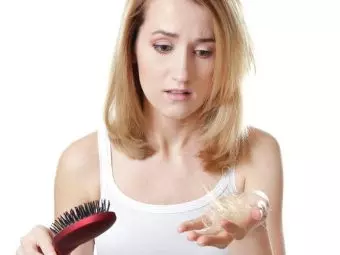 How To Combat Thyroid Induced Hair Loss Using Home Remedies
How To Combat Thyroid Induced Hair Loss Using Home Remedies Saw Palmetto For Hair Loss: Side Effects And Precautions
Saw Palmetto For Hair Loss: Side Effects And Precautions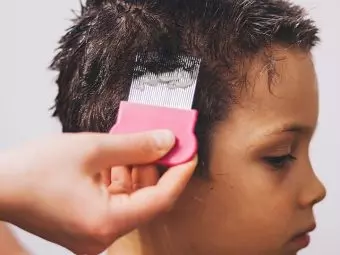 What Are The Main Causes Of Hair Loss In Children?
What Are The Main Causes Of Hair Loss In Children? 7 Best Yoga Poses That Boost Hair Growth And Thickness
7 Best Yoga Poses That Boost Hair Growth And Thickness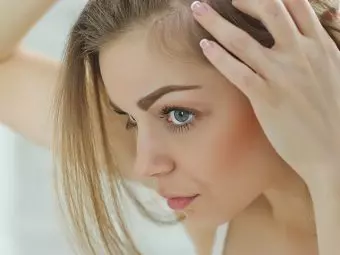 8 Simple Ways To Treat Hair Loss At The Temples
8 Simple Ways To Treat Hair Loss At The Temples How To Use Almond Oil To Help Control Hair Loss
How To Use Almond Oil To Help Control Hair Loss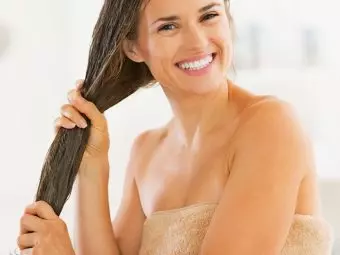 15 Effective Hair Masks To Treat Hair Loss
15 Effective Hair Masks To Treat Hair Loss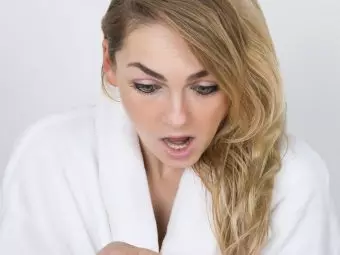 6 Best Vitamins For Hair Fall Control – Do They Really Work?
6 Best Vitamins For Hair Fall Control – Do They Really Work? 20 Herbs For Hair Loss That Stimulate Hair Growth
20 Herbs For Hair Loss That Stimulate Hair Growth